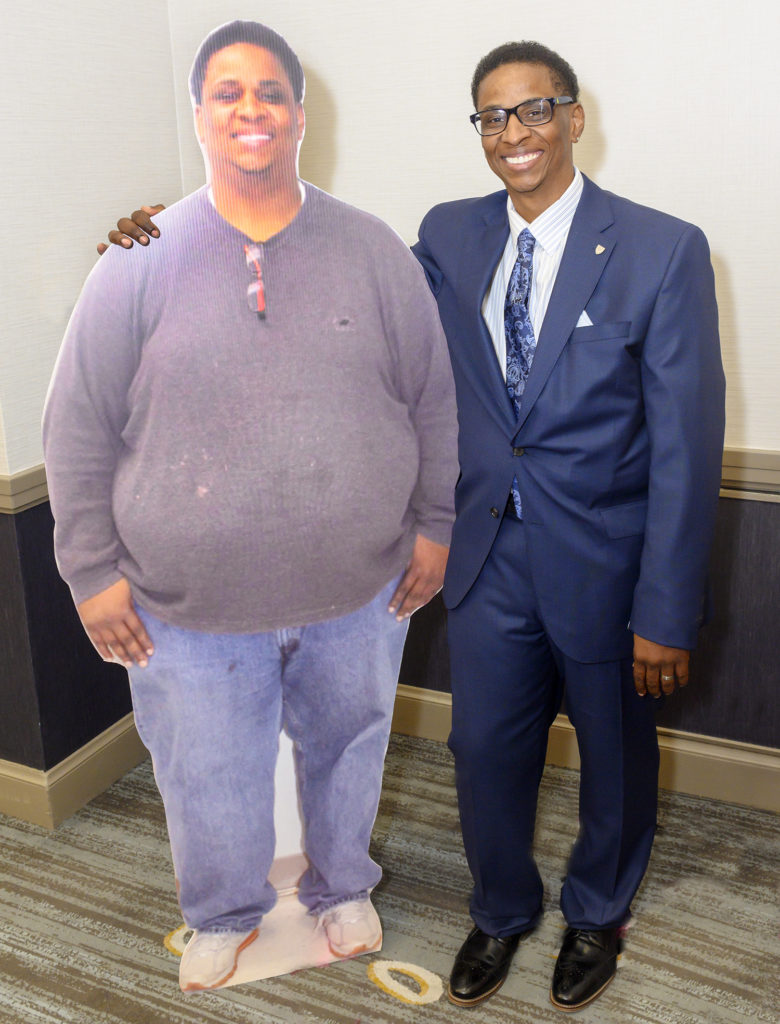
Meet Dr. Robert Wegner
Dr. Wegner, a board-certified general surgeon, joined the St. Francis Center for Surgical weight loss in 2010 and currently serves as Medical Director. He currently performs over 400 cases per year and specializes in laparoscopic gastric bypass, laparoscopic
gastric sleeve, and converting laparoscopic gastric bands to gastric bypass with only one surgery. He completed his general surgery residency at the University of Illinois at Chicago and bariatric fellowship at the University of Iowa, the recognized
birthplace of weight loss surgery. During fellowship he published journal articles reporting the remarkable benefits of laparoscopic gastric bypass leading to the resolution of type 2 diabetes and hypertension.
Meet Eric!
Gastric Bypass surgery patient, down more than 160 pounds five years after surgery.

Eric's Story
Type of Surgery: Gastric Bypass
Starting weight: 384
Pounds lost since surgery: 160
Medical Conditions before Surgery: borderline diabetic, sleep trouble
Conditions that have improved since surgery: energy, no longer borderline diabetic
Why did you decide to have surgery: Diabetes and high blood pressure runs in my family. I didn’t want that for me.
Why Saint Francis: I knew they would take good care of me. They are nice people who care.
How has your life improved: I am able to do more things with my family. I walk the mall with my wife and don’t have to look for the first place to sit down and rest. I get to spend less on smaller sized clothes. I am a truck driver and now
I can get in and out of my truck with no trouble.
What is one thing you never thought you could do that you are able/willing to do now: Run a mile in under 10 minutes.
Disclaimer: This is the testimonial of an actual patient. However, results will vary by individual. Weight loss surgery is generally designed for those with a body mass index (BMI) equal to or greater than 40, or equal to or greater than 35 with serious co-morbidities. Laparoscopic adjustable gastric banding with the Lap Band® is also FDA-approved for weight loss surgery in people with a BMI of 30 to 35 who have at least one obesity-related condition. Weight loss surgery is considered safe, but like many types of surgery, it does have risks. Consult with your physician about the risks and benefits of weight loss surgery.
Meet Kimberly!
Gastric Bypass surgery patient, down more than 120 pounds eight years after surgery.

Kimberly's Story
Type of Surgery: Gastric Bypass
Starting weight: 285
Pounds lost since surgery: 120
Medical Conditions before Surgery: Diabetes and hypertension (High Blood Pressure)
Conditions that have improved since surgery: High blood pressure and diabetes
Conditions that have gone away/disappeared/been cured: Diabetes is gone; High blood pressure is reduced
Why did you decide to have surgery: Health reasons to improve my quality of life.
Why Saint Francis: I was actually referred by a friend who was a patient. Prior to our conversation I knew nothing about it.
How has your life improved: My co-morbidities have decreased, by physical activity has increased and my personality and social life have come alive.
What is one thing you never thought you could do that you are able/willing to do now: Stand in front of a room and be a confident Kim physically as well as mentally.
Anything else: The weight loss introduced me to one of my daily loves and therapy regimens, ZUMBA. I came to love it so much I became a teacher. I love teaching this format because it allows me to minister to others and help them.
Disclaimer: This is the testimonial of an actual patient. However, results will vary by individual. Weight loss surgery is generally designed for those with a body mass index (BMI) equal to or greater than 40, or equal to or greater than 35 with serious co-morbidities. Laparoscopic adjustable gastric banding with the Lap Band® is also FDA-approved for weight loss surgery in people with a BMI of 30 to 35 who have at least one obesity-related condition. Weight loss surgery is considered safe, but like many types of surgery, it does have risks. Consult with your physician about the risks and benefits of weight loss surgery.
BMI Information
BMI stands for Body Mass Index, and it is a tool to measure mass based on your weight in relation to your height. Your BMI can help gauge your risk of certain diseases that can occur in people who have a higher percentage of body mass. The higher
your BMI, the higher your risk may be. A BMI of 40 is about 80 to 100 pounds over “normal” weight.
Am I a candidate for bariatric surgery?
To qualify for bariatric surgery an individual must:
- Have a BMI of 40 or greater.
- Have a BMI of 35-39, with significant obesity-related medical conditions such as:
- Diabetes
- High blood pressure
- High cholesterol
- Obstructive Sleep Apnea
- Cardiovascular disease




